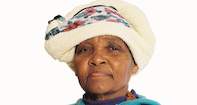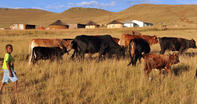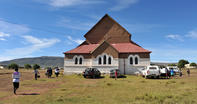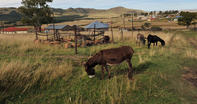Beauty Skefile

One of the first things I can remember is playing children's games, like skipping and hula hoops, in the streets of Retreat in Cape Town. We were black, white and coloured children, all playing together. I didn't even know I was a native then. I went to an Afrikaans school and understood the language because I was growing up among Afrikaans people. Later, that would change.
In those days, the sign you were ready for school was when you could put your arm over your head and touch your ear on the opposite side. So I don't know how old I was when I started school but I was big already, older than children when they start school these days. Things were better back then. The kids today are too wise.
You can't do anything and they will ask you why you're doing it. In those days, if you asked such questions your parents would smack you and say, 'Why do you ask all those questions?' and that would be the end of it. These days, children have so much to say, arguing with you all the time and thinking they have the answers.
Tenjiwe Tutu

As children, we were satisfied with what we had, because we did not know anything else. The village I lived in was a beautiful area. There was grass all around our house and about a kilometre away were some mountains covered in thick bushes.
I went back there some years ago when I was 53 or 54 and I couldn't walk very far up those mountains, but as a little girl I used to run up them quickly with no problems at all, like a little goat, tlok tlok tlok. My friends and I used to make dolls out of the dried mielie cobs after the kernels had been pounded into ground mielies.
We also made houses out of sticks for our dolls, weaving grass through the sticks to keep them upright and picking pretty flowers from the veld to put in between the sticks.
Goldie Qayiya

During my childhood, we climbed the mountain for fun. Often there were as many as 15 of us: my father, mother, her sister and all the children. We carried up buckets of stamped mielies and beans to eat at the top, pouring a cooking fat called Holsum over it all.
We had lots of pigs at home and if we had slaughtered one shortly before, we would carry up some of the meat for our picnic. After climbing for an hour and a half we were at the top and could see the wide ring of mountains surrounding the settlements all around St Mark's, the river cutting its path across the land beneath us and sometimes, in the distance, wild animals. Occasionally we would see springbok, but more often it was jackals.
Felicia Mfamana

I was about 11 and, as usual, my friends Nombeko, Jongikhaya and Nomvulazana had come to play. Our dolls were made from the dried cobs of the mielies that our parents grew in their fields. The childhood games I played when we were young was all very well, but as I grew older I realised I didn't want to get married at all. I loved learning and decided I would be a lady teacher.
I would have a good job helping children, and would be able to help my parents. 'You must have an education,' my father always told me. 'Go and learn how to write well and speak well. I want you children to have an easier life than I had, so learn everything you can.' He was talking from experience.
As a young man, he had worked underground as a miner; later he had worked very hard in his fields and looking after his cows. It was a good life, but a hard one. He wanted things to be different for us. But his wishes were not enough. When I was in Standard Five, my mother died. We were never hungry at home.
There were always enough vegetables from our fields and we had the milk from our cows. But after my mother's death there was not enough money for uniforms, school shoes and books. I was very distressed, as was my father, but there was nothing we could do. I had to stop school.
By Jo-Anne Smetherham